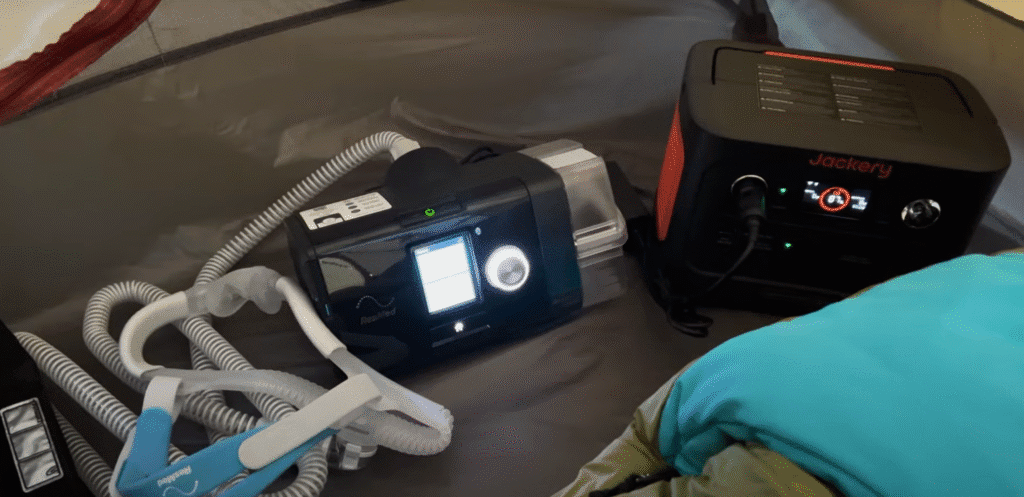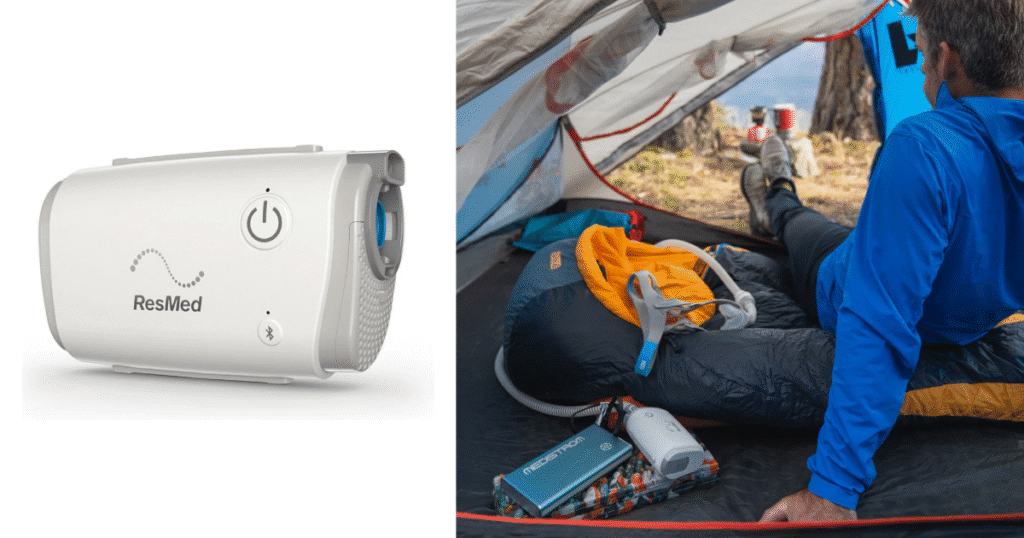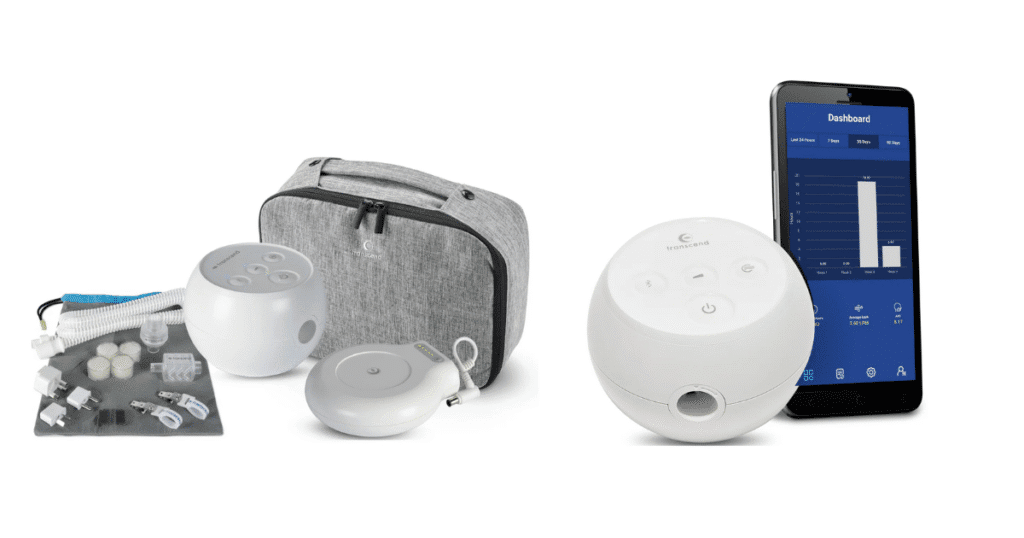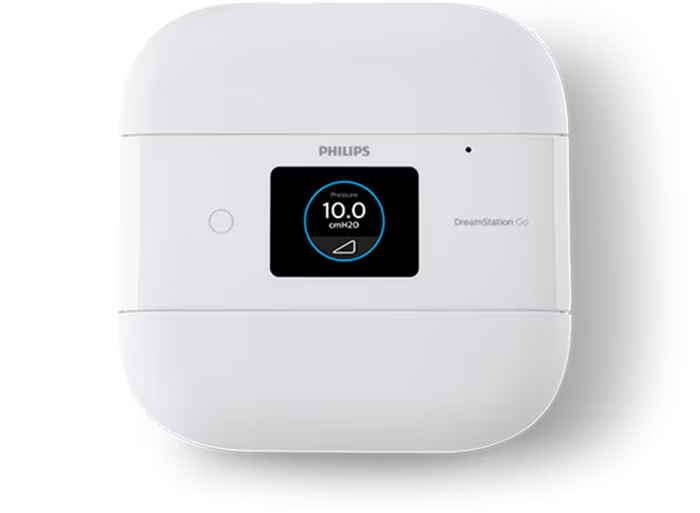Top 5 Battery Powered CPAP Machines for Your Camping Adventures
If you’re an avid camper who relies on CPAP therapy, you know how important it is to have a portable machine that you can rely on. This comprehensive guide will help you choose the perfect battery-powered CPAP for your next camping trip, ensuring you get restful sleep even in the wilderness.

Disclosure: As an Amazon Associate I earn from qualifying purchases at no extra cost to you.
Why Battery Powered CPAPs Matter for Campers
Camping often means limited access to electrical outlets, but that doesn’t mean you have to compromise on your sleep therapy. Battery-powered CPAPs allow you to continue treatment without interruption, waking up refreshed and ready for your outdoor adventures.
Factors to Consider When Choosing a Battery Powered CPAP
When selecting a battery-powered CPAP for camping, look out for these key things:
- Battery life
- Weight and portability
- Noise level
- Durability and weather resistance
- Compatibility with your existing CPAP mask and accessories
- Pressure settings and altitude adjustment capabilities
Let’s dive into five of the best battery-powered CPAP machines that make camping trips more comfortable.
Best Battery Powered CPAP Machines for Camping: Comparison Chart
| Machine | Weight (lbs) | Dimensions (inches) | Key Features (Verified) | Battery Life (Typical, per Charge) | Noise Level | Altitude Adjustment |
|---|---|---|---|---|---|---|
| ResMed AirMini | 0.66 | 5.4 x 3.3 x 2.1 | Waterless humidification, Bluetooth app, portable battery compatible | 1-2 nights | ~30 dBA | Auto |
| Transcend Micro | 0.48 | 3.6 x 3.6 x 2.4 | WhisperSoft, GentleRise/AirRelief, app, battery compatible | 1-2 nights (extendable with bundle) | Low (quiet) | Auto |
| Philips DreamStation Go | 1.86 | 5.9 x 5.9 x 2.3 | Micro-tubing, touch screen, USB port, optional battery | 1-2 nights | ~30 dBA | Auto |
| HDM Z2 Auto | 0.65 | 6.5 x 3.3 x 2.0 | Nitelog app, auto-pressure, optional PowerShell battery | 1-2 nights | 26 dBA | Auto |
| Apex Medical XT Fit | 1.76 | 5.7 x 5.1 x 3.9 | PVA relief, low power use, optional heated humidifier | 1-2 nights | Quiet | Manual/Auto options |
1. Best Overall – ResMed AirMini

The ResMed AirMini is a compact CPAP machine that’s perfect for campers who prioritize portability. Weighing just 0.66 pounds, it’s currently one of the smallest CPAP machines available.
Despite its tiny size, the AirMini delivers impressive performance.
Key Features:
- Ultra-compact design
- Waterless humidification system
- Bluetooth connectivity for easy adjustments
- Compatible with ResMed’s portable battery pack
The AirMini’s waterless humidification system is particularly useful for campers, as it eliminates the need to carry water for humidification. This feature saves space and weight in your camping gear.
However, it’s worth noting that the machine can be slightly noisier compared to some larger models. If you’re a light sleeper or sharing a tent, you might want to consider this factor.
The Bluetooth connectivity allows you to adjust settings easily through a smartphone app, which is convenient when you’re in a cramped tent or sleeping bag.
Check Price of the ResMed AirMini
2. Transcend Micro Auto Travel CPAP

The Transcend Micro Auto Travel CPAP is designed with portability in mind, making it an excellent choice for campers who need reliable sleep therapy on the go. As the world’s smallest CPAP machine, its ultra-compact design and lightweight construction make it ideal for outdoor adventurers.
Key Features:
- Weighs less than 0.5 pounds
- WhisperSoft technology for quiet operation
- GentleRise and AirRelief pressure technologies
- Battery power compatible for off-grid use
- Auto-start and auto-off functionality
- Altitude adjustment capabilities
The Transcend Micro’s incredibly small size and weight make it perfect for backpacking or car camping where every ounce matters. Its battery compatibility allows for extended camping trips without access to electrical outlets, giving outdoor enthusiasts the freedom to explore remote locations.
The device’s altitude adjustment feature automatically compensates for elevation changes, which is particularly useful when camping in mountainous regions. The GentleRise technology gradually increases pressure to help users fall asleep more comfortably, while AirRelief adjusts pressure during exhalation for easier breathing – both helpful when adapting to sleeping outdoors.
The MySleepDash app connectivity via Bluetooth allows campers to track their sleep data even in remote locations, providing valuable insights into therapy effectiveness during outdoor adventures.
Check Price of the Transcend Micro
Check Price of theTranscend Micro Power Bundle
3. Philips Respironics DreamStation Go

The DreamStation Go offers a great balance between portability and features. While it’s slightly larger than the AirMini, it’s still compact enough for easy packing and provides some extra functionalities that campers might appreciate.
Key Features:
- Integrated battery option
- Micro-flexible tubing for added comfort
- Touch screen display for easy navigation
- USB port for charging other devices
One standout feature of the DreamStation Go is its ability to charge other devices via its USB port. This can be incredibly useful when you’re trying to minimize the number of chargers you’re carrying on your camping trip.
The micro-flexible tubing is another camping-friendly feature, as it’s less likely to get tangled or kinked in a cramped tent. The touch screen display makes it easy to adjust settings even in low light conditions, which is often the case when camping.
Check Price of the Philips Respironics DreamStation Go
4. HDM Z2 Auto Travel CPAP Machine
The HDM Z2 Auto is an upgrade from the Z1 Auto Travel CPAP Machine, offering even more features for the discerning camper. It’s designed to be user-friendly and adaptable to various camping scenarios.
Key Features:
- Weighs 0.65 pounds
- Optional PowerShell battery
- Nitelog mobile app for data tracking
- Auto-adjusting pressure
The Z2’s Nitelog mobile app allows you to track your sleep data even when you’re off the grid. This feature can be particularly useful for monitoring how different camping environments affect your sleep quality.
The auto-adjusting pressure feature ensures that you receive optimal therapy throughout the night, even if your sleep position changes or you experience altitude-related breathing changes.
The optional PowerShell battery integrates seamlessly with the machine, providing a compact and efficient power solution for your camping trips.
5. Apex Medical XT Fit
The Apex Medical XT Fit rounds out our list with its combination of affordability and reliability. It’s a great option for campers on a budget who don’t want to compromise on quality.
Key Features:
- Compact and lightweight design
- PVA pressure relief technology
- Low power consumption
- Integrated heated humidifier option
The XT Fit’s low power consumption is a significant advantage for campers, as it helps extend battery life. This means you can potentially get more nights of therapy from a single battery charge.
The PVA pressure relief technology provides comfort by reducing pressure during exhalation, which can be particularly useful when sleeping in different positions while camping.
The integrated heated humidifier option is unusual for a portable CPAP and can be a game-changer for campers who struggle with dry air, especially in colder camping environments.
Tips for Using Your Battery Powered CPAP While Camping
- Invest in a high-quality portable battery pack for extended trips. Look for batteries specifically designed for CPAP use, as they often provide more reliable power and longer run times.
- Consider a solar charger for multi-day adventures. Solar chargers can keep your CPAP battery topped up during the day, ensuring you have power for therapy each night. The Jackery HomePower 3000 Portable Power Station can be a practical setup for longer trips where sun is reliable (best for car camping or base-camp setup).
- Use a protective case to shield your CPAP from dust and moisture. Many manufacturers offer custom cases for their machines, but a general waterproof case can also work well.
- Bring backup power options, such as a car adapter. This can be a lifesaver if your battery runs out unexpectedly or if you’re car camping.
- Clean your CPAP regularly, even in the wilderness. Pack cleaning wipes or a small bottle of CPAP-safe cleaner to maintain hygiene during your trip.
- Adjust your pressure settings for high-altitude camping. If your machine doesn’t auto-adjust for altitude, ask with your sleep specialist before your trip to get suitable settings.
- Use a nose pillow mask to conserve battery power. These masks typically need lower pressure settings, which can help extend your battery life.
- Practice setting up your CPAP in your tent before your trip. This will help you identify any potential issues and ensure you can set up quickly when you’re tired after a day of camping.
- Consider the climate of your camping destination. In humid environments, you might be able to skip the humidifier to save power. In dry climates, a waterless humidifier can be a good compromise.
- Pack your CPAP in a easily accessible part of your camping gear. You don’t want to have to unpack everything to find your CPAP when it’s time for bed.
Conclusion
Camping with sleep apnea doesn’t have to be a challenge. With these top-rated battery-powered CPAP machines, you can enjoy the great outdoors without compromising your sleep therapy.
Remember to consider your specific needs, camping style, and budget when choosing the right machine for you.
Frequently Asked Questions
Can I use my regular CPAP machine for camping?
Regular CPAP machines are not designed for camping use. They need a constant power source and are often too bulky for easy transport.
Battery-powered CPAPs are specifically designed for portability and off-grid use.
How long do CPAP batteries typically last?
The battery life of portable CPAPs varies depending on the model and your pressure settings. On average, most batteries last between 1-3 nights of therapy.
Some high-capacity batteries can last 4-6 nights.
Are battery-powered CPAPs as effective as regular CPAPs?
Yes, battery-powered CPAPs are designed to provide the same level of therapy as regular CPAPs. They use the same technology and can deliver the same pressure settings.
Can I use a regular power bank to power my CPAP?
While it’s possible to use a regular power bank, it’s not recommended. CPAP-specific batteries are designed to provide the consistent power output that CPAP machines need for safe and effective operation.
How do I clean my CPAP while camping?
CPAP cleaning wipes are the most convenient option for camping. For more thorough cleaning, you can use a small amount of mild soap and water, making sure to rinse thoroughly and allow all parts to dry completely before use.
Can I use my CPAP at high altitudes?
Many modern CPAPs have automatic altitude adjustment features. If your machine doesn’t have this feature, ask your sleep specialist before camping at high altitudes.
They can advise on suitable pressure adjustments.
Are battery-powered CPAPs waterproof?
Most battery-powered CPAPs are not fully waterproof, but many are water-resistant. Some models offer optional waterproof cases for added protection during outdoor activities.
Can I charge my CPAP battery with a solar panel?
Some CPAP batteries are compatible with solar charging. Check the specifications of your specific battery and consider investing in a solar charger designed for CPAP use.
Do I need a prescription to buy a battery-powered CPAP?
Yes, like regular CPAPs, battery-powered CPAPs need a prescription. However, once you have a prescription for CPAP therapy, it typically covers all types of CPAP machines.
Can I use my battery-powered CPAP on a plane?
Most battery-powered CPAPs are FAA-approved for in-flight use. However, always check with your airline before traveling, as policies can vary.
Key Takeaways:
- Battery-powered CPAPs are essential for maintaining sleep therapy while camping.
- Consider factors like battery life, weight, and durability when choosing a machine.
- The ResMed AirMini and Philips Respironics DreamStation Go are top choices for their portability and features.
- Invest in extra accessories like solar chargers and protective cases for optimal camping use.
- Regular maintenance and proper power management are crucial for successful CPAP use in the wilderness.
Related Reading
- Best CPAP Machines with Humidifier
- Smallest CPAP Machines for Travel
- Best CPAP Hose Holders
- CPAP Mask Liners for ResMed f30i and f20
- ResMed CPAP Masks for Side Sleepers
- Fiber Filled CPAP Pillows
- CPAP Cleaning Machine for ResMed Airsense 10
Health Disclaimer: This article is for informational purposes only and is not medical advice. Consult your healthcare provider before making changes to your CPAP therapy.
